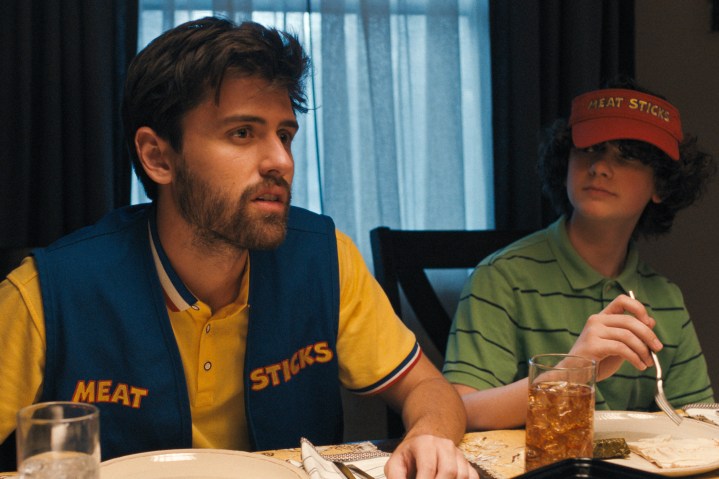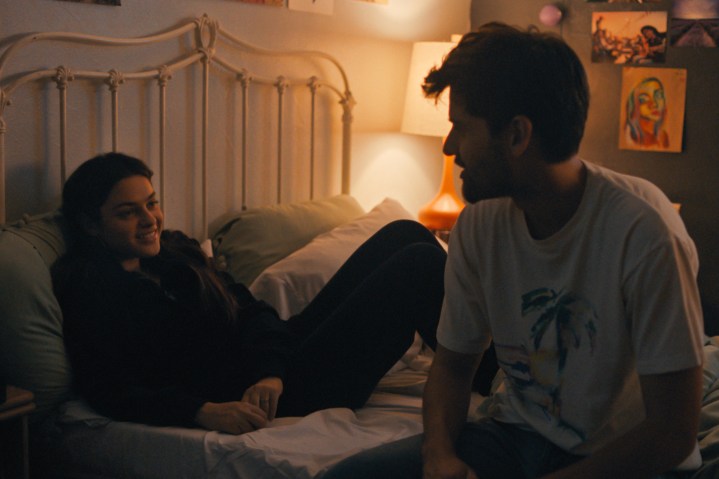Cha Cha Real Smooth is one of the most open-hearted films you’re likely to see this year. To those who were lucky enough to see Shithouse, the first film from writer/director/star Cooper Raiff, that won’t come as much of a surprise. Raiff’s feature debut boasted the same vulnerable, proudly unashamed-to-cry attitude that’s present throughout all of Cha Cha Real Smooth. But while a lot of attention has been given to how willing Raiff is to wear his heart on his sleeve, it’d be a disservice to both Cha Cha Real Smooth and its predecessor to refer to them simply as “nice” films.
In Shithouse, Raiff deftly navigated one college freshman’s feelings of loneliness and uncertainty as he struggled to adjust to a life away from home. In Cha Cha Real Smooth, Raiff has fast-forwarded the clock, turning his attention to a young man (played, once again, by himself) who is in the midst of trying to carve out a new life for himself after college. Both films grapple with the kind of confusing emotions that bubble to the surface whenever one chapter of a person’s life ends, and while Raiff brings a heightened level of sensitivity to his characters’ personal issues, he doesn’t shy away from the messiness of their inner lives.
That’s especially true in Cha Cha Real Smooth. It’s a film that’s about as hopelessly romantic as one can get, but it’s less interested in the ways two people can fall for each other and more fascinated by the ways growing up tends to complicate love, and vice versa.
A certified party-starter

Cha Cha Real Smooth follows Andrew (Raiff), a college graduate who moves back home to live with his bipolar mother (Leslie Mann), his younger brother, David (Evan Assante), and his stepfather, Greg (Brad Garrett), whom Andrew maintains an actively contentious relationship with. Trapped in a dead-end job, Andrew feels himself growing increasingly listless until he discovers a sense of renewed purpose for himself after he manages to rescue a neighborhood party from becoming a boring disaster.
His performance at the party not only lands him a job as his town’s resident Bar Mitzvah and birthday party host but also leads to him crossing paths with Domino (Dakota Johnson), an attractive young mom, as well as her autistic daughter, Lola (Vanessa Burghardt). Shortly after their meeting, Andrew begins to serve as a quasi-babysitter to Lola, all while building a close and flirtatious relationship with Johnson’s Domino, who happens to be engaged to Joseph (Raúl Castillo), a lawyer whose cases frequently take him away from his fiancée and her daughter.
If this all sounds messy and overly complicated, that’s because it is, but Raiff, to his credit, doesn’t shy away from the messiness of Andrew’s life, nor does he revel in it. Instead, the writer-director brings the same observational sense of humor and empathy to Cha Cha Real Smooth that he injected into his first film. His handling of Andrew and Domino’s will-they-or-won’t-they romance, in particular, makes it obvious why Raiff has earned comparisons to filmmakers like Richard Linklater, another artist whose interest in the passage of time has led to him making a career’s worth of observant, humorous, and unabashedly sincere gems.
An identity crisis

Much like Linklater, Raiff is able to imbue his films with a radiant sense of empathy, which is just another way of saying that you never feel like the filmmaker is judging any of his characters — even when he lets them make obviously self-destructive decisions. In Cha Cha Real Smooth, Andrew’s inability to enter into the post-college stage of his life leads him into a number of romantic encounters — some of which are more fulfilling than others — but it also forces him to reevaluate many of the beliefs that he’s built his identity around.
He’s not the only one in the film who’s struggling to enter into a new chapter in their lives though. Johnson’s Domino is similarly struggling with her own fears about settling down and getting married, and the relationship that blossoms out of her and Andrew’s shared insecurities continually defies expectations. Their first interaction at a middle schooler’s party has all the notes of a traditional rom-com meet-cute, but their relationship becomes uniquely complicated and intimate from that moment on.
In a lesser film, the event that leads to their first official “night together” might come across as contrived or manipulative, but Johnson and Raiff’s chemistry keeps Domino and Andrew’s relationship from ever feeling forced or inauthentic. The two actors have surprisingly palpable chemistry together on-screen, and Johnson, in particular, elevates nearly every scene she’s in.
Complicated questions

That won’t come as much of a surprise to anyone who has paid attention to Johnson’s career over the past few years. There are moments here when her sheer magnetism almost makes her seem like a fish out of water — or rather a movie star in a film that’s too small for her — but her ability to dive into the minds of women struggling with the direction that their lives have taken (see also: The Lost Daughter) stops her casual charisma from overwhelming Cha Cha Real Smooth.
Her star power isn’t quite matched by anyone else in the film, though, Leslie Mann does turn in one of her best performances in years as the mom to Raiff’s floundering Andrew. Raiff’s script, meanwhile, doesn’t know how to stop when it’s ahead, and the film’s interest in tying off its characters’ problems as neatly as possible results in Cha Cha Real Smooth lasting about 10 minutes longer than it should. But the film’s failure to recognize its own, better ending doesn’t matter all that much considering how emotionally resonant everything is that comes before its superfluous epilogue.
That’s because the story Cha Cha Real Smooth ultimately tells feels like a mature and organic progression of the one Raiff told in his debut feature. Both films are about the painful process of learning to live away from the people and places that you’ve tied yourself to, but Cha Cha Real Smooth makes its most compelling points when it’s using that foundation to interrogate the ways in which love can both heighten and complicate our moments of growth.
As one particularly raw conversation between Domino and Andrew proves, love may be important, but it’s not nearly as essential as understanding when it’s time to hold on and when it’s time to let go.
Cha Cha Real Smooth premieres in select theaters and on Apple TV+ on Friday, June 17.



